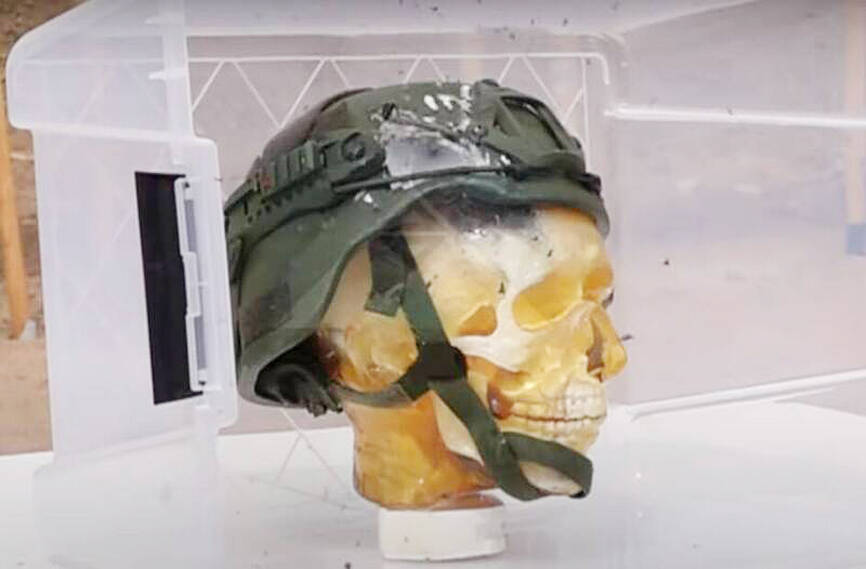The military’s standard EMBH-105 helmet appeared to show signs of deformation and spalling from pistol fire in a test conducted by a Taiwanese-American YouTuber.
In a video uploaded on Sunday, the YouTube channel “Little Uncle Sam’s Gun and Fun” (山姆小叔Gun&Fun) compares the durability of Taiwanese, US, Chinese and Russian helmets by firing a pistol at each one to compare how well they hold up.
The channel last year uploaded a video that appeared to show that the military’s standard body armor offered insufficient protection against 5.56x45mm rifle cartridges, which sparked an online debate. The Armaments Bureau at the time said the channel had used an inappropriate testing method on the armor.

Photo: Still image taken from YouTube channel “Little Uncle Sam’s Gun and Fun”
Last month, the Military of National Defense indicated in a report to the legislature that a new ballistic plate insert for the body armors offering improved protection against modern rifle ammunition would enter mass production next year.
In the channel’s latest video, its crew tested a variety of helmets against 9x19mm Parabellum and 7.62x25mm Tokarev rounds fired at a distance of about 5m.
The 9mm is the world’s most ubiquitous pistol ammunition and the 7.62mm Tokarev is used in Chinese People’s Liberation Army submachine guns.
Some of the Taiwanese helmets were supplied by Democratic Progressive Party New Taipei City Councilor Lin Ping-yu (林秉宥), according to the video.
Although 9mm fire did not penetrate the EMBH-105 helmet, it did exhibit a 27.4mm deep deformation, one of the test’s worst against that caliber.
The Taiwanese helmet sustained severe deformation after being struck by the more powerful 7.62mm Tokarev cartridges, which formed a deep gouge at the point of impact and destroyed much of the helmet’s outer material.
The tests suggest that the Taiwanese helmet offers significantly less protection than the others utilized in the demonstration except the Russian 6B47, which possesses a superior impact-absorbing liner, the video narrator says.
The EMBH-105’s outer layer also produced a significant amount of small fragments that peppered the ballistic gelatin placed under the helmet for the demonstration, suggesting they could have caused small lacerations to the head, the video showed.
The Ministry of National Defense on Monday said that the helmet’s performance was within design parameters and that the Massachusetts Institute of Technology’s ballistic research laboratory had previously conducted tests.
An improved helmet is being developed to enhance protection against concussion and spinal injuries, the ministry said, adding that the project is expected to be completed before the end of this year.
Additional reporting by CNA

US climber Alex Honnold is to attempt to scale Taipei 101 without a rope and harness in a live Netflix special on Jan. 24, the streaming platform announced on Wednesday. Accounting for the time difference, the two-hour broadcast of Honnold’s climb, called Skyscraper Live, is to air on Jan. 23 in the US, Netflix said in a statement. Honnold, 40, was the first person ever to free solo climb the 900m El Capitan rock formation in Yosemite National Park — a feat that was recorded and later made into the 2018 documentary film Free Solo. Netflix previewed Skyscraper Live in October, after videos

NUMBERS IMBALANCE: More than 4 million Taiwanese have visited China this year, while only about half a million Chinese have visited here Beijing has yet to respond to Taiwan’s requests for negotiation over matters related to the recovery of cross-strait tourism, the Tourism Administration said yesterday. Taiwan’s tourism authority issued the statement after Chinese-language daily the China Times reported yesterday that the government’s policy of banning group tours to China does not stop Taiwanese from visiting the country. As of October, more than 4.2 million had traveled to China this year, exceeding last year. Beijing estimated the number of Taiwanese tourists in China could reach 4.5 million this year. By contrast, only 500,000 Chinese tourists are expected in Taiwan, the report said. The report

Temperatures are forecast to drop steadily as a continental cold air mass moves across Taiwan, with some areas also likely to see heavy rainfall, the Central Weather Administration (CWA) said. From today through early tomorrow, a cold air mass would keep temperatures low across central and northern Taiwan, and the eastern half of Taiwan proper, with isolated brief showers forecast along Keelung’s north coast, Taipei and New Taipei City’s mountainous areas and eastern Taiwan, it said. Lows of 11°C to 15°C are forecast in central and northern Taiwan, Yilan County, and the outlying Kinmen and Lienchiang (Matsu) counties, and 14°C to 17°C

STEERING FAILURE: The first boat of its class is experiencing teething issues as it readies for acceptance by the navy, according to a recent story about rudder failure The Hai Kun (海鯤), the nation’s first locally built submarine, allegedly suffered a total failure of stern hydraulic systems during the second round of sea acceptance trials on June 26, and sailors were forced to manually operate the X-rudder to turn the submarine and return to port, news Web site Mirror Daily reported yesterday. The report said that tugboats following the Hai Kun assisted the submarine in avoiding collisions with other ships due to the X-rudder malfunctioning. At the time of the report, the submarine had completed its trials and was scheduled to begin diving and surfacing tests in shallow areas. The X-rudder,